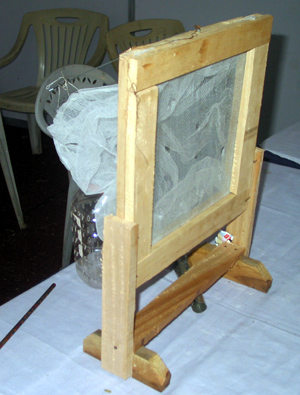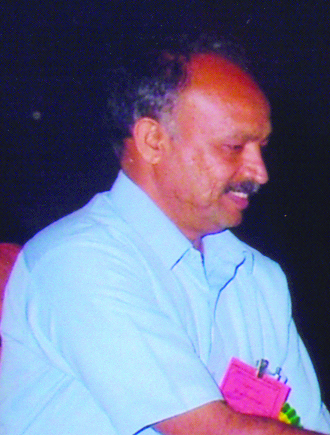Mohammed Wakeel Ahmed (42) hails from Kodipura, Channapattana taluk, Karnataka.
A farmer, he holds a BA degree from Kuvempu University, Chennapattana. His family consists of seven members. His wife stays in Bangalore with the children as they go to school there and Wakeel Ahmed stays back to supervise the activities in his farm. Wakeel Ahmed credits his parents with instilling the values of a righteous life in him and proudly claims that he is “a teetotaler and not slave to any addiction” and that his needs just extend to “three meals per day and a good night’s sleep.” Wakeel Ahmed spends his spare time listening to the radio, bird watching and mingling with friends and neighbours.
Genesis
Mohammed Wakeel Ahmed, a silk worm farmer, has developed an effective Uzi fly trap, by which 100% control of the Uzi fly menace in silk worm rearing is possible. Wakeel had a farm of two acres in his village on which he was growing mulberry leaves, the staple food for the growing silkworm caterpillars. But he was facing financial difficulties due to the decline in the cocoon price and due to the decline in the yield due to the destructive Uzi fly. One of the major problems faced by sericulture farmers is a tachnid fly, popularly known as Uzi fly (Exorista bombycis) which is an endo-parasitoid of the delicate silk-worm and causes 15-20% crop loss annually. This led him to try and find a cost-effective method to prevent the menace of Uzi fly and reduce the damage done to the silk worms. He tried all the ways and means as advised by the local sericulture department but it was to no avail. A slew of such failures set Wakeel Ahmed experimenting with different methods such as using organic manure, cow dung, and even fertile soil from the near by pond for his mulberry plants to reduce the attack of the Uzi fly.
Finally he came up with this idea for the fly-trap after he studied the life cycle of the female Uzi fly. While designing this device he says that he did not face any kind of technical difficulties. Wakeel Ahmed has been using this innovative trap for the last three years. About 250 farmers in the area who use this unique Uzi fly trap testify to its effectiveness and acknowledge that it is an excellent device to trap the flies. Wakeel Ahmed attributes his success in developing this device to the unrelenting support and encouragement from his family members, friends and neighbours as well as God’s grace.
The Uzi flytrap consists of a nylon mosquito mesh, a plastic bottle with perforation with a plastic cork attached to one end, a hollow metal pipe and PVC collars. The bottle used could be any ordinary disposable plastic one (soft-drink or any of the mineral water bottles) available in the market today. Firstly the windows are secured with nylon nets. Two–three holes are made for the flies to enter. To this a nylon mesh measuring 2ft by 3 inches with PVC collars inside is attached. This mesh is tied with a cotton thread to a hollow metal pipe 18 cm long with 2 cm diameter at the outer end and 3 cm diameter at the inner end. At the end of this pipe a fine nylon mesh is fixed and the pipe is slid into a plastic bottle and secured with a cork. Small holes are made in the plastic bottle and it is hung from the window or ventilator of the silk worm rearing room at a distance of 2ft. The pregnant female Uzi flies enter the fly-trap through the holes as they are attracted to the smell of the silk worm larvae. But they get trapped in the bottle and unable to come out, die.
This unique fly-trap does not pinch the farmer’s pocket as it costs only Rs.50 and by using this, the quality and yield of the cocoons is increased considerably. Furthermore it is simple and easy to use.
A progressive farmer…
For his outstanding contributions to sericulture Wakeel Ahmed has received certificates from the Dept. of Sericulture, Govt. of Karnataka as the Best Silkworm Grower, twice. His name also finds a mention in the bimonthly magazine brought out by the Central Sericultural Research and Training Institute, (CSRTI), Mysore. He wishes to continue with the process of innovation if proper financial aid is available. Wakeel Ahmed believes that there is room for improvement in the device. He suggests that it is advisable to make provisions to install the trap at the time of constructing rooms for silkworm rearing as this would be more effective in the long run. He has also successfully formulated a powder for the treatment and control of the “sunnakattu roga” (White Muscardine), a fungal disease affecting the silkworms in the trays. He sells this powder at Rs.25/- per kg and claims that this powder does not affect the growth of silk worms negatively. For all his experiments, Wakeel Ahmed is rightly called a “farmer scientist”.
A generous innovator…
Wakeel Ahmed generously shares his innovation with fellow sericulturists and is open to suggestions, which would make the trap more efficient. He firmly believes that the information regarding the availability of the flytrap must be disseminated to all silkworm rearers through proper channels as it provides a solution to the Uzi fly menace, which all farmers are terrified of and which seemed to defy all efforts to do away with them. Wakeel Ahmed hopes that if all the farmers in an area practice this method, Uzi flies could be eradicated from the entire locality. NIF has sanctioned an amount of Rs. 31, 250 from its Micro Venture Innovation Fund for the prototype development and market survey of the Uzi Fly Trap along with another innovation- the modified silkworm rearing tray by S.M.Mangali.








